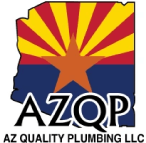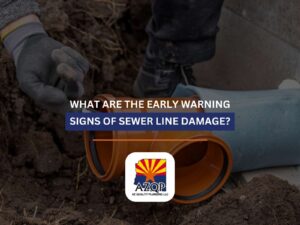Why Am I Running Out Of Hot Water So Fast?
Common Causes & Solutions
If you’ve ever stepped into the shower only to be met with lukewarm water after just a few minutes, you’re not alone. We’ve all been there. So why does your hot water run out so fast, and how can you fix it?
These are common questions that come up in those frustrating moments. After all, hot water is essential for comfort and daily routines. When it runs out too quickly, it can throw everything off. Whether it’s a tank that’s too small, sediment buildup, or a failing heating element, understanding the cause is the first step toward fixing the problem.
If you live in Maricopa City or the surrounding areas, our team at AZ Quality Plumbing is here to help diagnose the issue and get your water heater running reliably again. In this guide, we’ll cover the most common reasons your hot water runs out too soon, and what you can do to solve it.
Common Causes Of Running Out Of Hot Water
Several factors can cause your hot water to run out quickly. Knowing these common issues will help you identify the problem and find the right fix.
1. An Aging System
Water heaters aren’t built to last forever. Once they reach 10 to 15 years of use, efficiency drops significantly, and the tank struggles to keep up with demand. If your system is old, it may simply no longer be capable of supplying enough hot water for your household. In that case, upgrading to a modern unit through a professional water heater installation is often the best fix.
2. A Tank That’s Too Small
Sometimes the issue is simply capacity. If your family has grown or your household uses multiple showers, dishwashers, and laundry cycles, a small tank won’t keep pace. Tankless systems or larger tanks are designed to cover higher demand, ensuring hot water flows as long as you need it.
3. Thermostat Set Too Low
Another overlooked cause is thermostat settings. If the temperature is set too low, water may not get hot enough or may cool down before it’s fully used. Adjusting it to a range between 120°F and 140°F is usually enough to fix the problem, balancing safety and comfort while extending hot water availability.
4. Sediment & Hard Water Issues
If you notice your hot water lasting less and less over time, minerals in the water may be to blame. Sediment settles at the bottom of the tank, taking up space and forcing the heater to work harder with less efficiency.
Regular maintenance, such as flushing the tank, helps remove mineral buildup. In areas with particularly hard water, a professional water softener installation can prevent future deposits and keep your water heater running efficiently.
5. Dip Tube Damage
The dip tube is a small but essential piece inside your water heater. Its job is to send cold water to the bottom of the tank so it can be heated. If it breaks, cold water mixes with the already-heated supply at the top, cutting showers short. Replacing the tube is a relatively simple repair that can make an immediate difference.
6. Heavy Usage All At Once
If multiple people are showering while the dishwasher and washing machine are running, it’s no surprise that the tank empties fast. Even a properly sized heater can’t handle unlimited demand at the same time. Staggering household usage, like running appliances at night instead of during morning showers, helps extend hot water when it’s needed most.
7. Heating Components Wearing Out
In electric units, the heating elements inside the tank are what keep the water hot. When one of them fails, the heater simply can’t keep up. The result: lukewarm showers and hot water that vanishes in minutes. A licensed plumber can quickly test and replace these parts to restore proper performance.
8. Pressure Or Location Problems
Sometimes the issue lies outside the tank. A faulty pressure-relief valve can cause temperature swings, while a water heater located far from bathrooms or kitchens can lead to long waits and perceived shortages. Installing a recirculation system or replacing defective valves keeps hot water consistent and readily available.
9. Shared Systems In Apartments
For those living in apartment complexes, shortages can happen because the building’s water heating system is shared. At peak times, when neighbors are also showering or using appliances, you’ll notice the hot water disappears more quickly. Coordinating usage or talking with building management about upgrades may be the only solutions in these cases.
When To Call a Plumber For Hot Water Problems
Not every hot water problem requires a full replacement. In many cases, it may just involve:
- Flushing sediment buildup from the tank.
- Replacing a faulty thermostat or valve.
- Fixing or upgrading internal components.
However, if you’ve already tried small adjustments and still struggle with hot water shortages, it’s time to call a professional. An experienced plumbing company can thoroughly inspect your system, recommend the best solution, and restore consistent comfort to your home.
Get Reliable Hot Water Back With Professional Plumbing Services
Running out of hot water too quickly can have many causes. Once you understand what’s happening, the solution becomes much clearer.
At AZ Quality Plumbing, we offer a full range of top-rated plumbing services to keep your home’s water running safely and efficiently. Don’t let cold showers interrupt your daily comfort. Contact us today!











